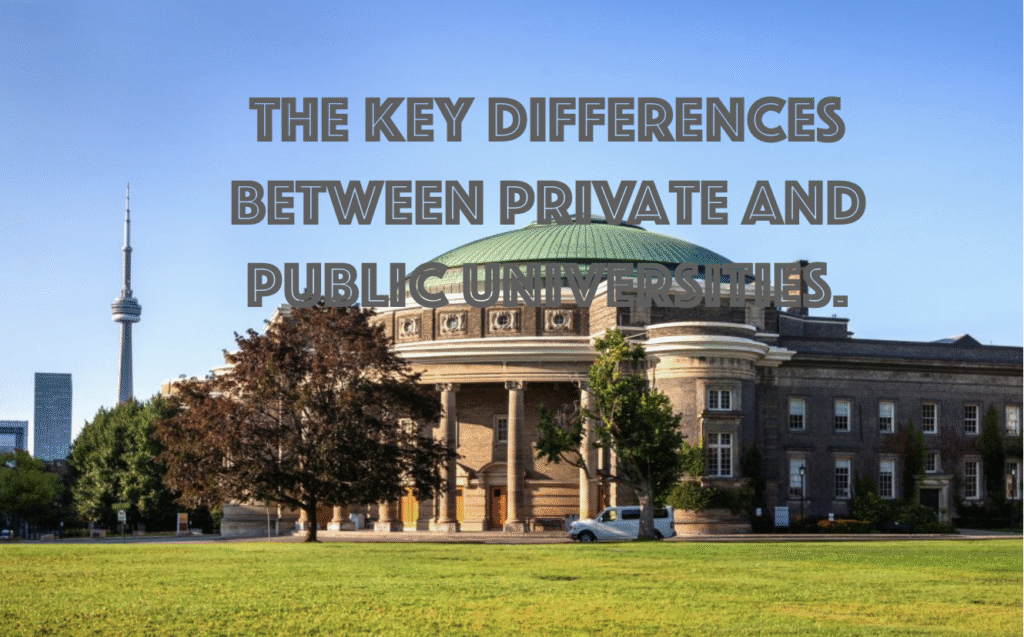Choosing between a public and a private university is one of the most significant decisions you’ll face when pursuing higher education. Each type of institution offers unique advantages and drawbacks that can impact your college experience, financial situation, and career prospects. Understanding the key differences between public and private universities will help you make an informed choice that aligns with your goals and values.
In this article, we will explore the pros and cons of studying at a public versus a private university, taking into account factors such as cost, class sizes, campus culture, and academic offerings. By the end of this article, you’ll have a clearer understanding of which type of institution may be the best fit for you.
Understanding the Key Differences Between Public and Private Universities

Before diving into the pros and cons, it’s important to understand the fundamental differences between public and private universities.
1. What is a Public University?
A public university is an institution that is funded primarily by state or federal government sources. These universities are typically larger and offer a wide range of undergraduate and graduate programs. Public universities tend to have lower tuition rates for in-state students and provide access to various state-funded grants and financial aid programs.
2. What is a Private University?
A private university is an institution that is privately funded, either through tuition, private donations, or endowments. Private universities tend to have smaller student populations and more specialized programs. They often have higher tuition rates but can provide substantial financial aid and scholarships to students based on merit, need, or other criteria.
The Pros of Studying at a Public University
1. Lower Tuition Costs (Especially for In-State Students)
One of the most significant advantages of attending a public university is the lower cost of tuition, particularly for in-state students. Public universities are funded by state governments, and as a result, they often offer reduced tuition rates for residents of that state. For many students, this can make attending a public university much more affordable compared to private institutions.
In addition to lower tuition, public universities also offer a wide variety of financial aid options, including state-funded grants, scholarships, and federal aid programs.
2. Larger Campus Community and Diverse Student Body
Public universities tend to have larger student populations, which means there is more diversity in terms of backgrounds, experiences, and perspectives. This diversity can enrich your college experience, providing opportunities for cultural exchange, social interaction, and networking.
Larger universities also tend to have more student organizations, extracurricular activities, and social events, which can help you meet new people and develop a wide range of interests.
3. Extensive Range of Academic Programs
Public universities generally offer a broad selection of academic programs and degrees. With large faculties and extensive resources, you can expect to find diverse fields of study ranging from traditional majors to niche disciplines. Whether you’re interested in engineering, the arts, or the social sciences, public universities usually have many options to choose from.
Public universities also tend to have strong research programs and collaborations with industry, which can be advantageous for students looking to pursue careers in research, science, or technology.
4. Access to State-Funded Resources and Research Opportunities
Public universities often receive significant funding from state governments for research, infrastructure, and student support services. This funding allows for state-of-the-art facilities, research opportunities, and a wide range of student services, such as career counseling, health services, and academic support programs.
Research-focused public universities often collaborate with government agencies and private companies, which can provide valuable networking and career opportunities for students.
The Cons of Studying at a Public University

1. Larger Class Sizes and Less Personalized Attention
One of the downsides of attending a public university is the larger class sizes, particularly in introductory courses. Public universities often have a higher student-to-faculty ratio, which means you may not receive the same level of personalized attention as you would at a private university. This can be challenging if you prefer smaller classes and one-on-one interactions with professors.
2. Limited Financial Aid for Out-of-State Students
While in-state students benefit from reduced tuition rates, out-of-state students may face significantly higher tuition fees at public universities. Additionally, financial aid options for out-of-state students may be more limited compared to those available for in-state residents, which can make attending a public university more expensive for non-residents.
3. Bureaucratic Processes and Less Individualized Support
Public universities, due to their larger size and more complex administrative structures, can sometimes have bureaucratic processes that feel impersonal. This may result in slower response times to inquiries, less direct support from staff, and a feeling of being “just another student” among the thousands on campus.
4. More Limited Campus Resources and Facilities
While public universities often have access to significant state funding, some campuses may still lack the advanced resources and facilities that are available at private universities. Research labs, dormitory accommodations, and campus infrastructure may not be as modern or well-maintained as at private institutions.
The Pros of Studying at a Private University
1. Smaller Class Sizes and More Personalized Attention
One of the primary advantages of attending a private university is the smaller class sizes. Private universities typically have a lower student-to-faculty ratio, which means you are more likely to receive individualized attention from your professors. This can be especially beneficial if you value close relationships with your instructors and want a more personalized learning experience.
Smaller class sizes also foster more active participation in discussions and encourage deeper engagement with the material, which can enhance your overall academic experience.
2. Stronger Networking Opportunities and Alumni Connections
Private universities often have strong, tight-knit alumni networks that can help students connect with potential mentors, employers, and industry leaders. These networks can be a valuable resource when it comes to internships, job placements, and career advancement after graduation.
Additionally, private universities often place a strong emphasis on student success and provide robust career services to help students secure employment after graduation.
3. Access to Specialized Programs and Resources
Private universities tend to offer more specialized and unique programs that may not be available at public institutions. Whether you’re interested in a specific area of study, an interdisciplinary program, or an innovative research project, private universities may offer the flexibility and resources to tailor your education to your specific interests and goals.
Private institutions also tend to have more advanced facilities, resources, and campus amenities due to their ability to attract private donations and secure endowments.
4. Prestigious Reputation and Smaller Campus Community
Private universities often have a strong reputation for academic excellence and a more exclusive, prestigious atmosphere. Many private institutions are known for their rigorous academic standards and are recognized globally as top-tier universities.
The smaller campus size and more intimate academic community allow students to form closer bonds with their peers, leading to a more cohesive and personalized college experience.
The Cons of Studying at a Private University
1. Higher Tuition and Limited Financial Aid
Private universities generally have higher tuition rates compared to public universities. While they may offer substantial financial aid packages based on merit or need, the overall cost of attending a private institution can still be prohibitively expensive for some families.
Financial aid at private universities is often limited and may not fully cover the cost of tuition, which means students may need to rely on student loans or other external sources of funding.
2. Smaller Campus Community and Limited Diversity
Private universities tend to have smaller student populations, which can mean fewer options for extracurricular activities, social events, and organizations. The smaller community can sometimes feel less diverse, which may be a disadvantage for students who are looking for a broad array of cultural experiences.
Additionally, the exclusivity of some private universities can lead to a less diverse student body in terms of socioeconomic background, geographic location, and international representation.
3. Limited Variety of Academic Programs
While private universities often offer specialized programs, they may not provide as wide a variety of academic disciplines as public universities. For students seeking a broad range of academic options, this could limit the flexibility to switch majors or explore other fields of study.
4. Less Access to State-Funded Research Opportunities
Private universities, though well-funded by donations and endowments, may not have the same access to state-funded research opportunities or collaborations with government agencies that public universities benefit from. This can be a disadvantage for students who are interested in research-heavy fields or working with government entities.
Also Read : Navigating Financial Aid And Scholarships For University Students
Conclusion
Choosing between a public and private university ultimately depends on your personal preferences, academic goals, and financial situation. Public universities offer lower tuition rates, larger campuses, and a broad range of academic programs, but they may come with larger class sizes and less personalized attention. Private universities offer smaller class sizes, more individualized support, and prestigious reputations, but they come at a higher cost and may have fewer academic offerings.
When making your decision, carefully consider factors such as cost, class size, campus culture, academic offerings, and long-term career goals. Whether you choose a public or private university, the right institution for you is one that aligns with your needs and aspirations.
Frequently Asked Questions (FAQs)
1. What is the main difference between public and private universities?
The main difference lies in funding. Public universities are funded by state or federal governments and typically have lower tuition rates for in-state residents, while private universities are funded through tuition, donations, and endowments and often have higher tuition rates.
2. Which type of university is more affordable?
Public universities are generally more affordable, especially for in-state students. They receive state funding, which helps keep tuition costs lower.
3. Are private universities better than public universities?
Not necessarily. Both public and private universities offer unique advantages. Private universities tend to offer smaller class sizes and more personalized attention, while public universities often provide a wider range of academic programs and a larger, more diverse campus community.
4. Can I receive financial aid at a private university?
Yes, private universities offer financial aid, including scholarships, grants, and loans. However, tuition at private universities is typically









